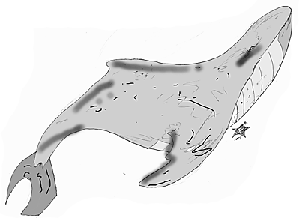


|

Illustration by Holly Randall
|
|
Arizona Daily Wildcat
Tuesday, March 29, 2005
Print this
Things you always never wanted to know
The streets of London were lit by gaslights instead of torches for the first time in 1807. Coal gas was used for this purpose.
The U.S. Fish and Wildlife Service restocks lakes by cascading newborn trout from an aircraft skimming the water at low speed.
The blue whale, subsisting on its blubber, can go up to half a year without eating.
A study of 72 factories in Russia in 1881 revealed that some workers were on 18- to 20-hour shifts, and they often lost most of their wages in fines levied by employers.
"To prevent violence" it was at one time customary at certain phases of the moon to chain and flog inmates of England's notorious Bedlam Hospital.
During the 100 days of the opening games at the Coliseum in Rome in 80 A.D., more than 5,000 animals were killed. They included elephants, tigers, lions, elks, hyenas, hippopotamuses and giraffes.
Vigilantes on the Barbary Coast around San Francisco committed at least 7,300 murders - an average of one a night - in a reign of terror between 1860 and 1880.
The metal osmium is one-sixth more dense than gold. An ingot of osmium the size of a dollar bill and 1 inch thick would weight nearly 13 pounds.
Efforts by German scientists to get top-level Nazi support for development of the atomic bomb were to no avail because Hitler expected a quick victory through conventional weaponry. Construction of the monster bomb would supposedly consume a score of years, and by then, the Third Reich would own the world, they thought.
Grains of sand are rounded by the action of the wind, which causes abrasion by blowing the sand particles against each other and surrounding obstacles. Once a grain reaches an almost perfectly spherical shape, it may keep that shape without further wear for millions of years.
Write a Letter to the Editor
|
|

|
